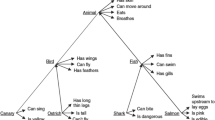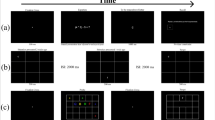Abstract
Subjects were asked to recall the names of the fifty United States under varied conditions. These conditions included free recall and cued recall. The recall of the fifty United States was poorer than expected for college students. The average recall was approximately 41 out of 50 states. When subjects were asked to fill in the names of the states on a blank map, recall dropped to approximately 32 out of 50 states. It appears that subjects can recall some states better than others. For example, recall is better for states in close proximity to a subject’s current residence. Perhaps subjects have a geographic bubble when it comes to recalling the names of the states.
Similar content being viewed by others
References
Abel, R.R. & Kulhavy, R.W. (1986). Maps, mode of text presentation, and children's prose learning. American Educational Research Journal, 23, 263–274.
Baddeley, A.D. (1981). The concept of working memory: A view of its current state and probable future development. Cognition, 10, 17–23.
Bednarz, S.W. (1995). Learning mnemonics to learn place geography. Journal of Geography, 94, 330–338.
Boehm, R.G. & Peterson, J.F. (1987). Teaching place names and locations in grades 4-8: Map of errors. Journal of Geography, 86, 167–173.
Brooks, L.R. (1968). Spatial and verbal components of the act of recall. Canadian Journal of Psychology, 22, 349–368.
de Souza, A.R. & Downs, R.M. (1994). Geography for Life: National Geography Standards: Executive Summary. Washington, D.C.: Department of Education, National Endowment for the Humanities, National Geographic Society.
Fitzhugh, W.P. (1992). Reforming geography education: What research says to teachers about geography instruction. Paper presented at the Meeting of the National Council for Geography Education.
Geography for Life: National Geography Standards, (1994). Washington, D.C.: National Geographic Research and Exploration.
Kosslyn, S.M. Ball, T.M. & Reiser, B.J. (1978). Visual images preserve metric spatial information: Evidence from studies of image scanning. Journal of Experimental Psychology: Human Perception and Performance, 4, 47–60.
Kulhavy, R.W. (1993). How geographic maps increase recall of instructional text. Educational Technology, Research and Development, 41, 47–62.
Metz, H.M. (1990). Sketch maps: Helping students get the big picture. Journal of Geography, 89, 114–118.
Nelson, D.L., Reed, V.S. & McEvoy, C.L. (1977). Learning to order pictures and words: A model of sensory and semantic encoding. Journal of Experimental Psychology: Human Learning and Memory, 3, 485–497.
Paivio, A. (1975). Coding distinction and repetition effects in memory. In G.H. Bower (Ed.), The Psychology of Learning and Motivation: Advances in Research and Theory (Vol. 9). New York: Academic Press.
Paivio, A. (1978). Mental comparisons involving abstract attributes. Memory and Cognition, 6, 199–208.
Shepard, R.N. & Metzler, J. (1971). Mental rotation of three-dimensional objects. Science, 171, 701–703.
Stimpson, P.G. (1991). Is it a long way to Tipperary? Suggestions for improving students locational knowledge. Journal of Geography, 90, 78–82.
Tulving, E. (1983). Elements of Episodic Memory. New York: Oxford University Press.
Wright, D.R. (1995). Mnemonics: An aid to geographic learning. Journal of Geography, 94, 339–340.
Author information
Authors and Affiliations
Rights and permissions
About this article
Cite this article
Reffel, J.A. Cued vs. free recall in long-term memory of the fifty united states. Curr Psychol 16, 308–315 (1997). https://doi.org/10.1007/s12144-997-1004-1
Accepted:
Issue Date:
DOI: https://doi.org/10.1007/s12144-997-1004-1




